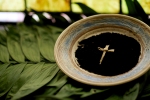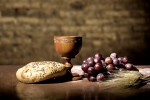March 2019
Becoming Disciples
Walking Wet
I have always had skinny, straight hair, which salon professionals flatter by calling, “fine.” I also had a proclivity in my early years for leaving the house with wet hair, even when it would freeze on the way to the bus stop. Something about getting on with the adventure of life felt more appealing than standing in front of a mirror with a blow dryer. Recently, my memories of wet hair and my understanding of baptism came together.
Baptized in the world
You see, I was reading Go Make Disciples: An Invitation to Baptismal Living, and I found the phrase “walking wet” to describe the experience of being baptized in the world. The idea that I have been a Christian disciple walking in the world, not running, was important to me. I am not running away from something or racing to a goal, moving so fast that I miss what’s right in front of me. Instead I am moving at a natural, if enthusiastic, pace, seeking and listening with my feet in extended contact with the ground. I have time, plenty of it in God’s economy, and I am moving forward. I am wet with the waters of baptism, washed and made new in the death and resurrection of Jesus Christ. My hair is damp and there’s a drip of water on the end of my nose that tastes sweet as it meets my tongue. Walking wet means allowing myself to be somewhat conspicuous, in some ways ordinary, but distinctly different from the urgent, fashionable, competitive posture American society wants to reward.
I am a wet, sometimes even soggy, work-in-progress, aware that I simultaneously inspire curiosity and need a towel. Being Christian is not a solitary, passive enterprise. It requires that I be bold and vulnerable, lead and follow. As the late Verna Dozier understood, “In baptism, every Christian has enough to learn and practice for a lifetime.”
When I remember that I am still wet from the font, I am much more likely to listen carefully for the still small voice of God, to tend the “echoes of transcendence” as Andrew Root describes them in Faith Formation in a Secular Age. Sometimes those echoes come in unexpected forms, like a conversation with Galina, an Uber driver. After learning that I teach at an Episcopal seminary and volunteering the contours of her own spiritual pilgrimage, Galina whispered the deep longing of her heart, “What will happen to me when I die? I do not want the life I love to end.”
Called to witness to God’s unconditional love
At a time when people are searching for meaning and purpose, for real, authentic encounters with God way beyond the walls of our churches, I believe I am called as a baptized person to show up and listen where they are. Walking “wet” makes it very clear something is happening, but it isn’t finished and I do not have all the answers. I, like all baptized people, am called to create and hold the space where people can learn to trust that God is present. I can be a living, breathing witness to the unconditional love of God. How I conduct myself has the potential to point others toward an encounter with the mystery of faith in the power of the Holy Spirit. It can actually draw people to the font, the source of living water.
Walking wet is also what happens when I stand by people in their tears. Soaked in their suffering and pain, I remember my own baptismal promises to “seek and serve Christ in all persons” and “strive for justice and peace among all people,” and I am compelled, with God’s help, to challenge the systems that make them cry. Walking wet is a good reminder that I am still learning and growing. It is a protection against becoming overwhelmed at the scale of injustice, the magnitude of evil. Instead, in my made-newness I am called to do the next right thing, whatever it is that is right in front of me. I am compelled by the water on my skin and the seal of oil on my forehead to step out in solidarity with the poor and marginalized. “Baptism dismisses us into the world! It does not make us more ‘churchy,’” as the missiologist, the Rev. Dr. Christopher Duraisingh wisely reminds us. Walking wet witnesses to the world that we do indeed have a story, “a defense for the hope that is in us” (1 Peter 3:15). We are resurrection people, and death has lost its sting.
The messier the better
In baptism we are “marked as Christ’s own forever.” It is radical good news. As Paul described it to the Romans, “neither death, nor life, nor angels, nor rulers, nor things present, nor things to come, nor powers, nor height, nor depth, nor anything else in all creation, will be able to separate us from the love of God in Christ Jesus our Lord.” Learning to claim our identity as people of God and live into our high calling as the baptized community is lifelong and life-wide work. So, next time you pass a baptismal font on your way out of church, reach in, scoop up a handful of water and splash it over your head. The messier the better! Walk into the world literally wet and discover anew what was prayed over your head in baptism,
“Heavenly Father, we thank you that by water and the Holy Spirit you have bestowed upon these your servants the forgiveness of sin, and have raised them to the new life of grace. Sustain them, O Lord, in your Holy Spirit. Give them an inquiring and discerning heart, the courage to will and to persevere, a spirit to know and to love you, and the gift of joy and wonder in all your works.” (BCP, 308)
Let us “walk wet” together as members of the Body of Christ! I can see the t-shirts now.
Elisabeth (Lisa) Kimball is the Associate Dean of Lifelong Learning, and Professor of Christian Formation and Congregational Leadership at Virginia Seminary. She joined the VTS faculty in 2009, having served on the faculty in the College of Education at the University of Minnesota with dual appointments in the School of Social Work (Youth Studies) and the Department of Curriculum and Instruction where she coordinated the Master’s Program in Youth Development Leadership. In addition to teaching and managing a dynamic department, Lisa is frequently invited to speak on Christian formation, evangelism, and congregational vitality. She is currently directing a 5-year project, funded by the Lilly Endowment Inc, Baptized for Life: An Episcopal Discipleship Initiative to support congregations as they explore themes of Christian vocation and calling. Before assuming an academic career, Lisa spent twenty years serving on the staff of five congregations and two dioceses in California and Minnesota, and is now an active member of the Church of the Epiphany in D.C.
Resources:
- Working Theology(ies) of Baptism by Greg Syler, ECF Vital Practices blog, April 7, 2015
- Baptism in Community by Richelle Thompson, ECF Vital Practices blog, July 23, 2012
- Revolution Brews in the Baptismal Font by Herb Gunn, Vestry Papers, September 2009
- Everyday Christians by Alan Bentrup, ECF Vital Practices blog, June 12, 2017
- Episcopalians on Baptismal Mission, an ECF Vital Practices tool






